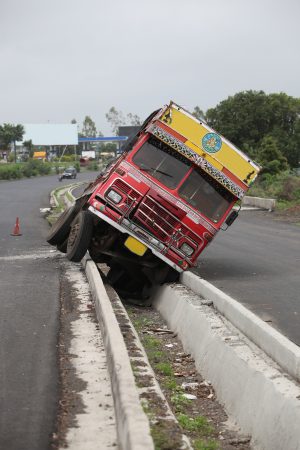In December 2023, India enacted three new criminal justice laws: the Bharatiya Nyaya Sanhita, the Bharatiya Nagarik Suraksha Sanhita, and the Bharatiya Sakshya Act. The three laws mark a groundbreaking legal transformation as they replace outdated British-era criminal laws, including the Indian Penal Code (IPC).
Among the notable provisions of the Bharatiya Nyaya Sanhita, which replaces the IPC, is Section 106(2), which has drawn considerable attention for the stringent punishment it prescribes for hit-and-run accidents. “Whoever causes the death of any person by rash and negligent driving of a vehicle not amounting to culpable homicide and escapes without reporting it to a police officer or a magistrate soon after the incident shall be punished with imprisonment for a term which may extend to ten years and shall also be liable to a fine,” it says.
This is a departure from the previous Section 304A of the IPC, which imposed a maximum two-year jail term or fines for analogous offenses.
While the intention to introduce stricter penalties for hit-and-run accidents is commendable — a proactive effort to enhance road safety and accountability — the absence of stakeholder consultation has sown seeds of discontent. It has provoked strong opposition from India’s trucking industry.
Truckers argue that the stringent provisions fail to account for the nuanced challenges they face on India’s congested roads. A paramount concern they have raised is the specter of unfair accusations and the inherent complexities of establishing culpability in hit-and-run accidents. These incidents often unfold in chaotic traffic scenarios, and identifying the responsible party is far from straightforward. The truckers argue that the law’s punitive measures might disproportionately impact them, leading to unjust arrests and imprisonment.
Their opposition to the new laws has snowballed into nationwide strikes that will severely impact the Indian economy.
The overarching objective of the BNS is to enhance overall legal mechanisms, covering a spectrum of criminal offenses ranging from cybercrime to white-collar offenses, reflecting a multifaceted approach to modernizing the legal landscape.
However, the opposition from the truckers is emblematic of a broader issue — the need for inclusive policymaking. This dissatisfaction serves as a clear reminder that laws, when made without considering real-world situations, might unintentionally cause disagreement and undermine the justice they aim to protect. In the pursuit of justice, it is essential to strike a delicate balance between punitive measures and the practical challenges faced by those navigating the complex legal landscape.
The concerns raised by stakeholders underscore the need for legislators to consider the broader implications of introducing stringent laws without addressing the underlying challenges. Achieving justice requires a holistic approach that considers the peculiarities of the diverse landscape, industries, and the economic ramifications of disrupting sectors.
Examining the concerns voiced by stakeholders reveals potential challenges in the equitable enforcement of the law, setting off a chain reaction that reverberates through the economy. As trucker associations have pointed out with regard to Section 106(2), a primary worry centers around the looming possibility of unjust accusations, amplified by the intricate nature of establishing culpability in criminal cases. These incidents unfold in diverse scenarios, further complicating the identification of the responsible party. Stakeholders assert that the punitive measures embedded in the law might disproportionately affect them, potentially resulting in legal actions perceived as unjust.
This underscores the imperative for a more nuanced approach to law enforcement — one that meticulously considers and addresses the real-world challenges encountered by individuals and businesses alike.
A more inclusive approach, encompassing the perspectives of all stakeholders, is crucial for fostering a sense of justice that resonates with the diverse fabric of the nation. The wheels of justice must turn smoothly, ensuring that accountability is meted out fairly, without unduly burdening any particular sector or jeopardizing the intricate dance of various industries that sustain the nation’s heartbeat.
As India grapples with the aftermath of stakeholder discontent following the enactment of the Bharatiya Nyaya Sanhita, policymakers must recognize the imperative of collaborative efforts and inclusive policymaking. The dissatisfaction expressed by various sectors serves as a poignant reminder that crafting a legal system demands a delicate balance — one that upholds accountability without unduly burdening sectors, thereby fostering a safer, more equitable, and harmonious society. As we stand at the crossroads of legal transformation, the wheels of justice must turn not only with the weight of authority but also with the momentum of collective wisdom and shared responsibility. Through such collaborative efforts, we can forge a path toward a legal system that ensures safety and accountability while standing as a beacon of fairness and inclusivity in the tapestry of our nation’s journey.

































